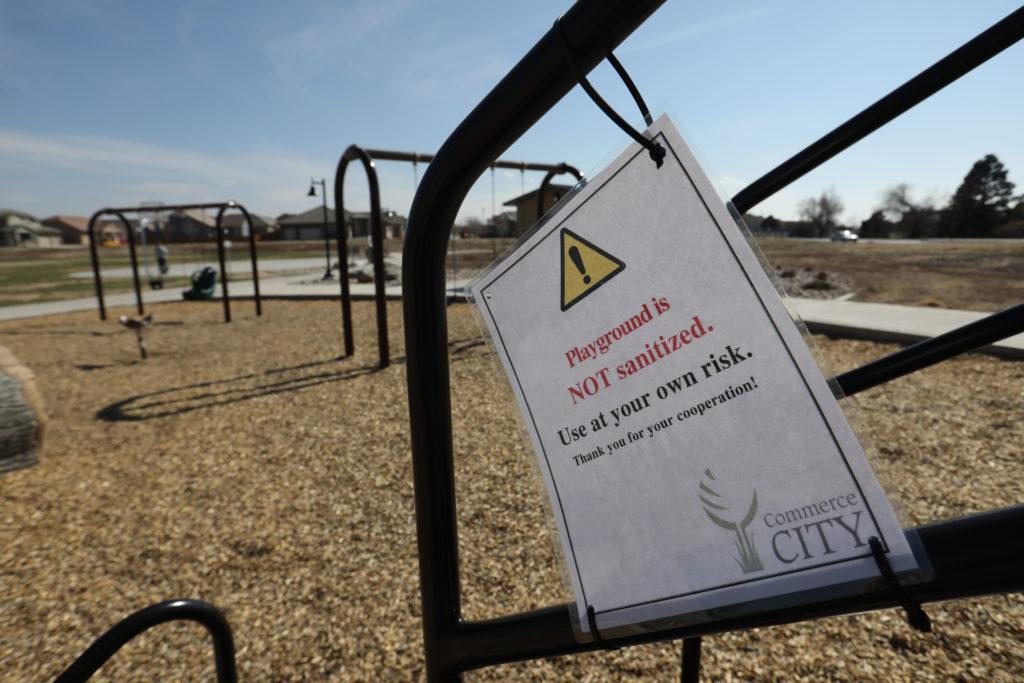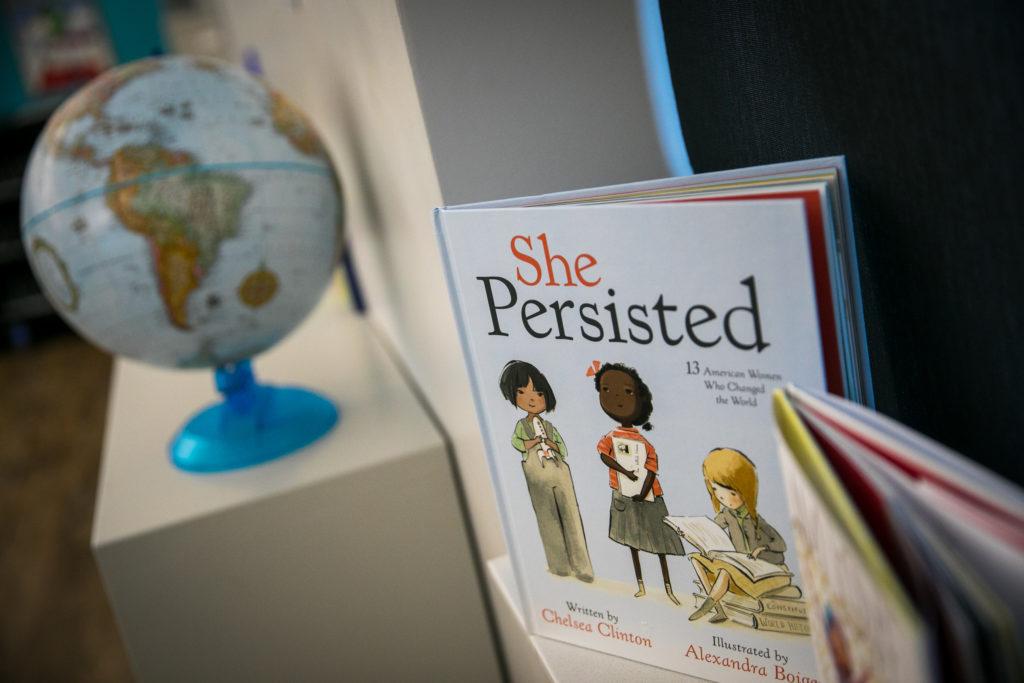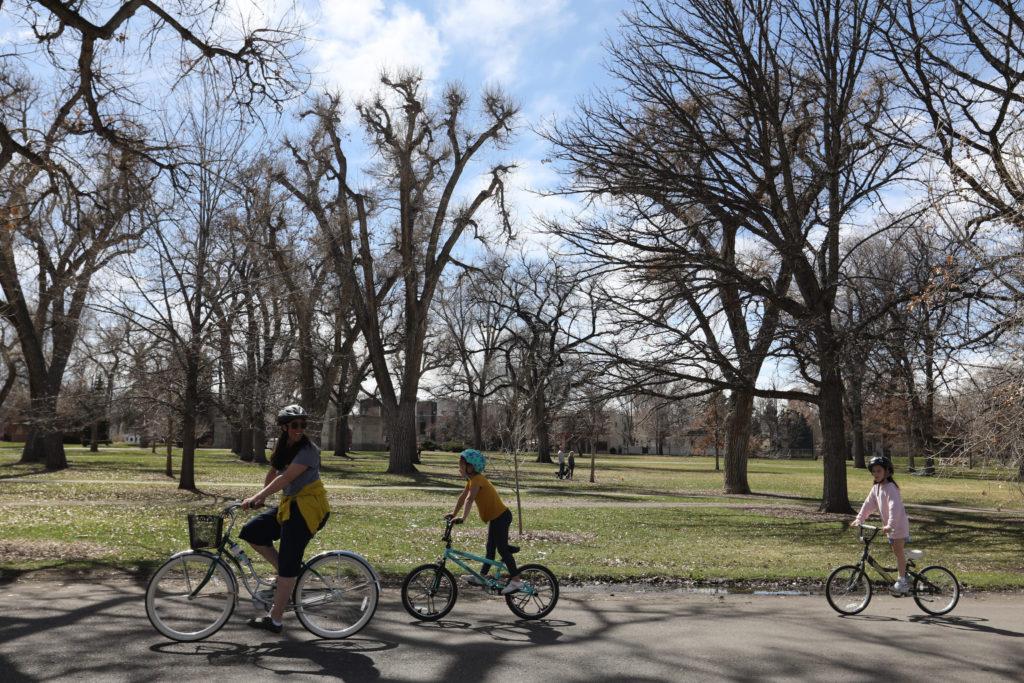
The list of things parents are worried about right now is as long as that unfurled roll of toilet paper you wish you had.
Worries about your elderly parents, about your finances and job security. We can't go to the gym or do activities. And in the middle of all this insecurity, parents now have to be their kids’ teacher. There’s that elusive toilet paper to find and, oh yeah, we have this thing called a global pandemic too.
“It’s impossible to be working and homeschooling your kids and dealing with global pandemic on your own,” says Tenly Williams, who has a 6- and 9-year-old.
The biggest challenge for the Williams family and their two children is the massive uncertainty.
“We as adults don’t deal with that very well,” she says. Her kids have been asking when they’re going back to school, what the plan is for the summer.
“It is extremely difficult for them to understand, ‘Well you’re not going to be at school before April 17, but you might not be able to go back that day either.’”
She thinks some of the anxiety she’s noticed in her children this weekend is partly because they’ve had two weeks to deal with the newness of all of it. “And they’re now starting to get to the part where they’re wondering why? Why are we doing this?” she says.
Dr. Scott Cypers is seeing four different types of more significant anxiety responses to COVID-19 in his practice.
He directs stress and anxiety programs at the Helen and Arthur E. Johnson Depression Center at the University of Colorado Anschutz Medical Center.

The first group are people who are typically highly anxious and now, they’re actually feeling relieved, “like, ‘Oh my God, now you know how I feel all day long.’”
In the second group, anxiety is like a weapon looking for opportunities to grow. This group’s anxiety has grown into fears around COVID-19, getting sick or the people they love getting sick. “That fear is now guiding them and controlling their actions,” Cypers says.
The third group Cypers calls the Dorothy-in-Kansas-there’s-no-place-like-home group. A lot of kids fall into this group. Typically, much of their anxiety stems from school — giving presentations or being social. Being home has completely taken away their anxiety. Parents are overjoyed, “They’re like, ‘I’ve got my kid back.’”
But for Cypers, they’re the most dangerous category. “Because they’re going to have to leave the house eventually and now they've spent a lot of time not having the practice or dealing with being out on the road and that’s going to be a problem,” he says.
In the fourth group, says Cypers, are clients spending most of their anxious energy worrying about older relatives and whether they are sheltering in place.
Cypers and Dr. Amy Lopez hosted — along with the Douglas County School District — a recent zoom meeting for parents about ways they can respond to and manage the anxiety. They will be hosting free, public interactive talks and discussions at this link every Thursday night from 8:00 p.m. to 9:15 p.m. “until the end of social distancing.” They’ll take up some of the barrage of questions parents had at the end of Thursday’s session.
Cypers told parents anxiety is like a ‘silly rabbit’ looking for tricks to control us. During the COVID-19 crisis, here are some of the primary tricks it’s using to control anxious brains:
- A to Z trick: That’s where you might be on step C but you’re already worrying about step Z. In the case of COVID-19, that looks like worrying about things six to eight months in the future, like “What's this world going to look like? How will I be?” That worry isn’t helpful because so much is changing on a daily basis. If you find yourself worrying about things beyond a month from now, tell your anxiety, “‘I’m not going to let that trick work. I'm going to worry about the next couple of weeks and what I can control,” says Cypers.
- Deep down trick: Deep down, your brain tells you you’re going to get the virus. Deep down you know someone in your family is going to die. Your brain tells you, “Don’t believe the facts. None of the shelter-in-place measures are going to work.”
- Broken record: It loves to repeat itself. Your worry plays over and over in your mind.
- Shiny object: Focusing on the movie or any distraction so we avoid dealing with what makes us anxious. Parents may see these behaviors manifesting more at home.
The antidote for all of these is awareness. The moment you call out the anxiety is the first step to conquering it. Both kids and adults need to hear what their “worry brain” is saying and talk back to it.
“Your job is to start realizing that anxiety is trying to trick you and take control of your brain. Your job is to respond like the Trix bunny rabbit commercial: “Silly anxiety. I'm not going to let that trick work and keep it from taking over.”
In forthcoming Thursday night Zoom chats, Cypers will address the next steps for conquering anxiety such as entering into a debate with your opponent, the anxiety, and using evidence to put it into perspective, to challenge it, poke holes in it, and ultimately conquer it. More information about confronting anxiety is here.
What parents do can contribute to children’s anxiety
The phenomenon of snowplow parenting, where parents clear any adversity from their child’s path, is fueling their anxiety about the world. Discussing the coronavirus with them in age-appropriate ways “is helping our kids learn to deal with adversity and roll with things, and that's going to be an important skill that teaches their anxiety that they can handle adversity,” Cypers says.
Parents who pretend that there is nothing wrong are going to hear a lot of people tell their kids, ‘Everything’s going to be fine.’ “But assurance in an anxious brain stokes it,” Cypers says. Saying everything's going to be okay prompts children to continually seek that reassurance, which grows anxiety.
Try not to give them assurance. Instead, say “We're doing all we can. We are working on it. We're trying to make things right. That's why we're doing what we're doing.”
Anxiety priming. If a child is already anxious and parents continually point out all the dangers such as “Oh, stay away from that person. Did you wash your hands? Don't touch the doorknob.” Those things are true.
“But we need to balance that with not only what's wrong and what can go wrong, but with what fun they can have, what good will happen today, what fun they had when they went outside and not just stoke all the things to be anxious about.”
Parents who engage in “hidden criticality.” In public, they praise and compliment people but then criticize them behind their backs. “It teaches our kids not to trust what we're saying and to worry that other people are thinking things [about us].”
Parents who engage in accommodation, changing environments so their kids don’t have to be anxious.
“It’s one of the number one things that leads us down a slippery slope to cause more anxiety when we let kids not have to deal with things,” he says. Instead, you want to start pulling away accommodations so children learn to deal with uncomfortable situations.
He cautions parents to be aware of their own media consumption and when it’s making them anxious.
“Because the news is just priming your anxious brain,” he says.
How to tell if kids or parents are not coping well in this crisis
Cypers says it’s normal for kids and parents to be a little more emotional during this time and kids are more difficult to manage. But if you start to see more prominent behavior changes, it could be time to seek help: changes in sleep, appetite, mood (feeling overwhelmed, upset, frustrated or angry), difficulty focusing, lack of motivation, feeling hopeless, loss of pleasure or increased substance use.
Stress is like water in a dam, says Cypers. It’s really important to find ways to get the water out of your dam. He recommends traditional stress management tools like exercise, venting, sharing, and journaling. It’s important your kids see you modeling what you want them to do to reduce stress.
“So for example, if you say, ‘Don't be on your phone. Don't watch movies. We want you doing painting or other things,’ but then you're on your phone relaxing, how is that sending the message of what's really important and valued?”
Get help to stay out of isolation
Isolation is dangerous for anxiety and depression. We might need someone to make sure we’re taking care of ourselves or even to push us to do it.
In the Zoom session, Cypers told parents to have this text at the ready for a friend: “I could use some extra support during this time. Could you help me by — ”
Be as specific as possible, for example: “Could you help me by letting me vent to you for 10 minutes tonight? Could you help me when I'm having a rough day with the kids? Can you talk to the kids over the phone? I know you can't come over right now. Can we do a virtual happy hour?”
Check-in with your kids
It’s important to talk to young people, especially high schoolers, about their sad situation, such as not going to graduation or prom or finishing out the sports season. They’re away from their friends; they’ve lost a lot. For more on age-appropriate ways to talk about the new coronavirus with kids, read our guide on what to do with kids at home.
“Give space for yourself too, to talk about the lemons, to vent about them, to share that ‘This sucks, I don't want lemons in my life’ and to balance that with how can I deal and go on and make some lemonade?’” Cypers says.
Talk to your kids about how the stay-at-home order is going for them. As parents, solicit feedback on how the family is operating, how the parents are doing. ‘How are we doing? Give us a grade. What’s going well? What do you like? What don’t you like? What can we tweak?’
Tenly Williams says her son has started saying, “These various things aren’t going to happen for two years.” Williams finally asked him why he keeps saying two years. “He just laughed and I think that’s what it feels like to him,” she says. “If there’s not a plan, it’s just mind-boggling.”
She’s learned to be honest no matter what. “When I don’t know the answer to their questions, I tell them I don’t know the answer. I’m not going to give them something easier because I don’t want to violate their trust and I don’t want to have that come back to bite me later.”
Lower your expectations for yourself
Lots of parents are struggling now because they’ve set an impossibly high bar for keeping children engaged. Dr. Amy Lopez, a child, adolescent and adult licensed clinical social worker at the Helen and Arthur E Johnson Depression Center at the University of Colorado Anschutz Medical Center, says working parents today actually spend more hands-on time with their kids than a stay-at-home mom did in the 1970s.
You don’t have to do that, especially right now, she says. Kids can figure out a lot of things on their own. They’ve just never had to in the age of helicopter or snowplow parenting and screens. So this generation has a low tolerance for boredom.
She says it’s okay for children to be bored. In fact, boredom breeds creativity. It’s the space where problem-solving grows. Children can learn what it was like to be a kid in the 1970s when they made up all their own fun.
“Their boredom is not your problem,” Lopez says. “Say, ‘I get you are bored. Find something to do.’ ”
Lopez says parents must focus on what they can control and realize that right now, in the middle of a pandemic, it is not the time for parenting perfection. Do what you can do.
“Just because some kids might be doing homework every day, great. Some kids might be on YouTube for the entire four weeks, and you know what? They’re all going to be OK. You do what you can do as a parent and what works for you and your family.”
The pandemic is new for everyone. Don’t beat yourself up if things descend into chaos.
“Expect that you're going to learn and grow and you're going to get better,” she says. “Be kind to yourself.”

Conduct family meetings to figure out expectations and how family members will help each other out, work as a team, figure out the process if there’s only one laptop, what are we going to do if we start getting on each other’s nerves, or deal with teenagers frustrations when they see their friends going out.
Shawna Fritzler says staying at home has been emotionally difficult for her 15-year-old daughter.
“She’s an extreme extrovert,” Fritzler says.
Some of her daughters’ teenage friends are posting pictures of themselves together at parties or gatherings.
“We go with science in this house,” Fritzler says. That’s not something you can do. We’re adhering to staying home.”
A simple way to “loosely” schedule children’s days
At the outset of the coronavirus, Scott Cypers saw a lot of parents burst out of the gates putting kids on a schedule that looked like a CEO’s. Every minute was scheduled. Everyone was burning out. It is true younger kids thrive with schedules and routine but it needs to be balanced with fun and free play.

He recommends families draw up four categories based on the family’s values. Write them down so kids can see them. For example:
- Mind Activities (i.e. for a 6-year-old, learning how to tie a shoe)
- Body Activities (building something with twigs outside, kicking around a ball)
- Soul Activities (art, creativity, music)
- Good Citizen of the House (chores, helping citizens, walking dog)
Kids can do two of each every day before free relaxation time.
Push back at work: This is not business as usual
You’re hearing a lot of kids in the background of Zoom meetings these days. Lopez says you may need to have an honest talk with your boss.
“I’m probably not going to be as productive,” she says. “My kids are at home and I am also trying to teach them. So I am trying to be a teacher, a cook, and a referee when I’m also trying to do business as usual.”
Lopez recommends writing yourself a job description. Then, cross it out and write yourself a pandemic job description. Set new expectations with yourself and your boss.
And finally, remember fun is the antidote to fear.
“Four-year-olds laugh about 600 times a day,” Lopez says. “Adults about 15. Maybe they know something we don’t know. What are you doing to have fun as a family?”
The Williams family has been doing that with a daily bike ride at 10 a.m. to places where they can safely social distance. One of the ground rules: Hands stay on the handlebars.
“That’s the time in the day it goes from really hard to at least manageable and at least some times actually really good,” Williams says.
The family thrives on structure and anything she tries to do before the bike ride feels forced. So it’s become like the family commute. It’s when the day starts for real. “It provides some sense of normalcy and structure and routine,” she says.








